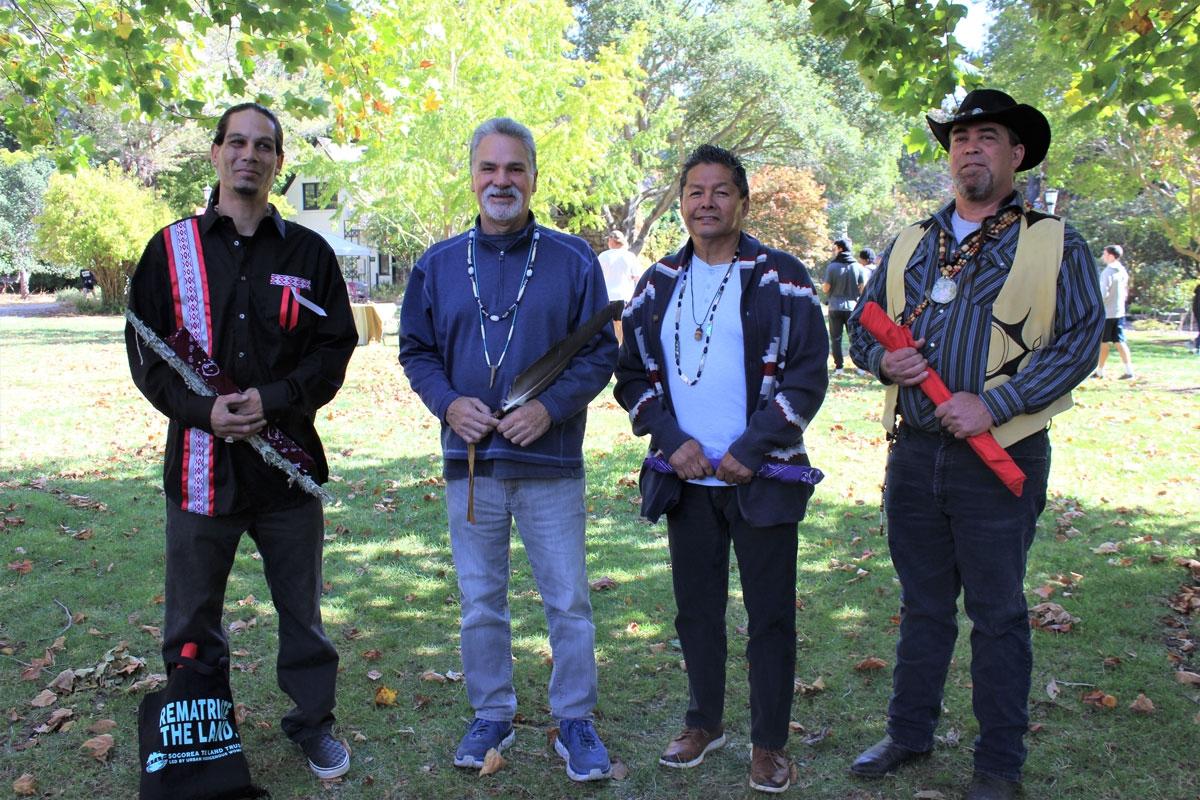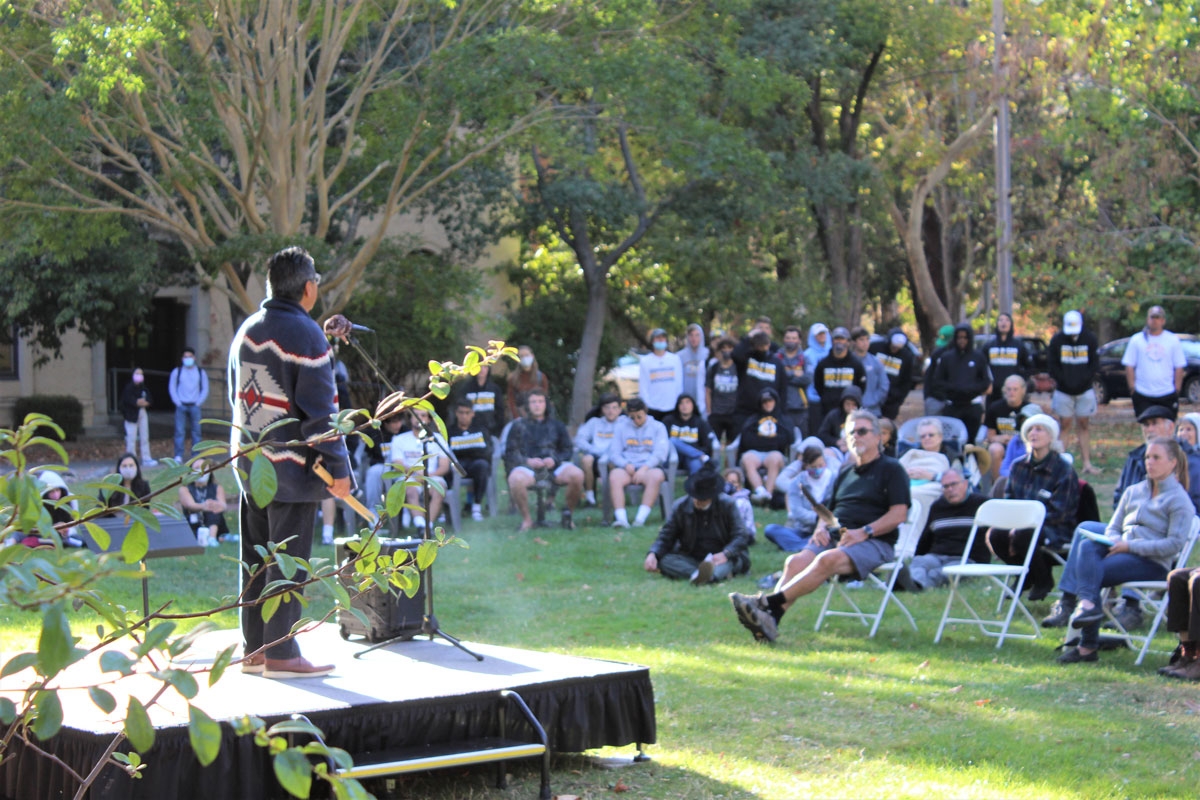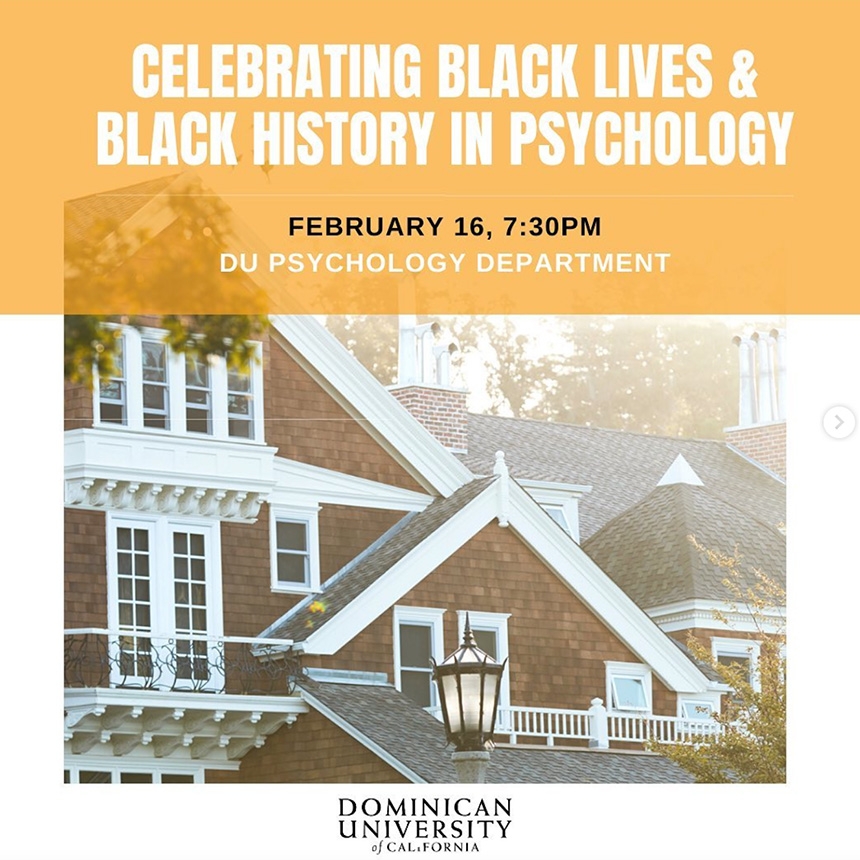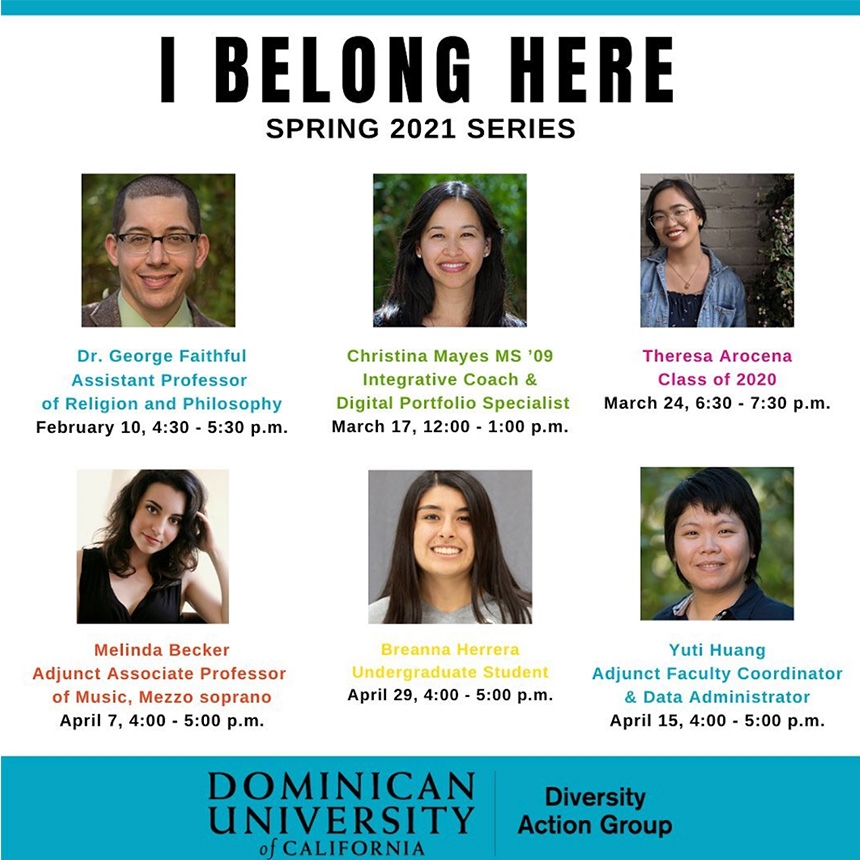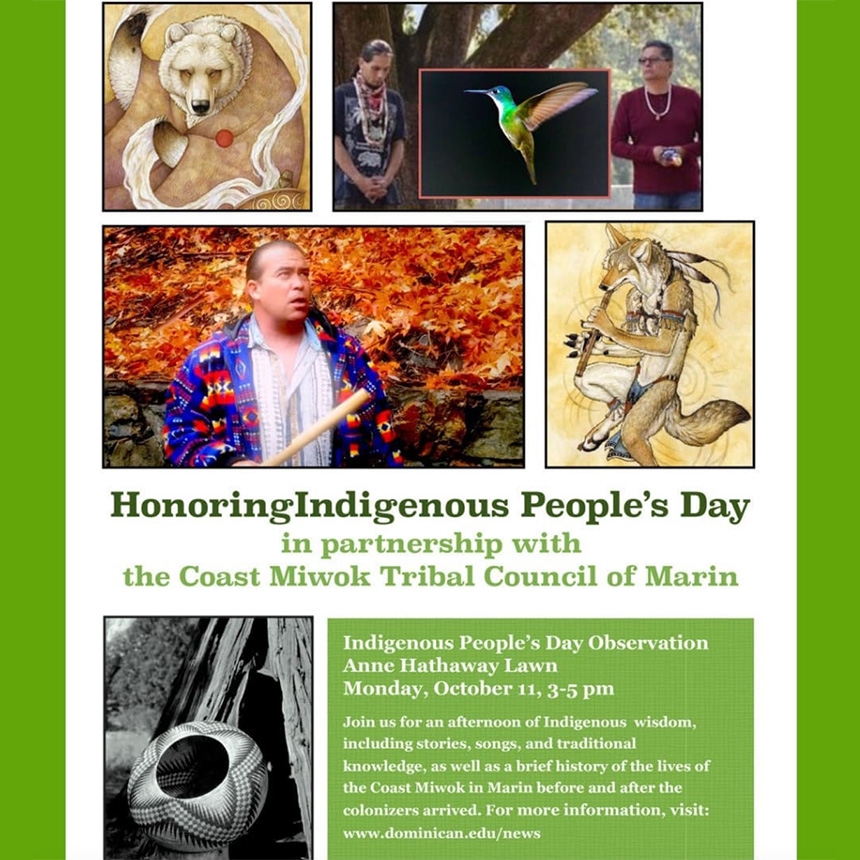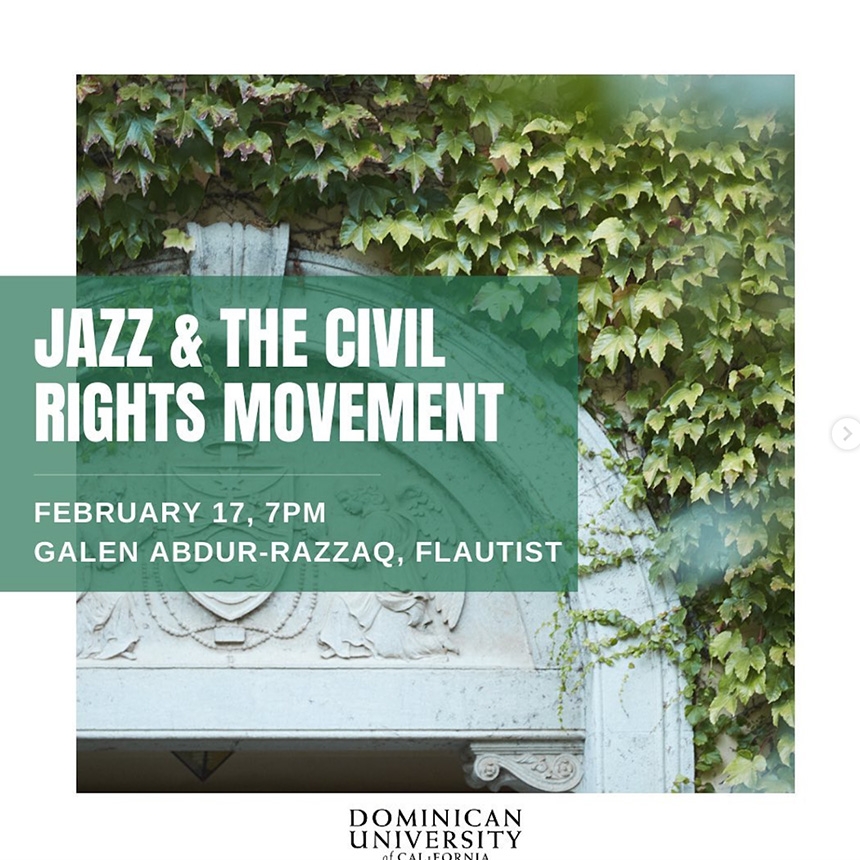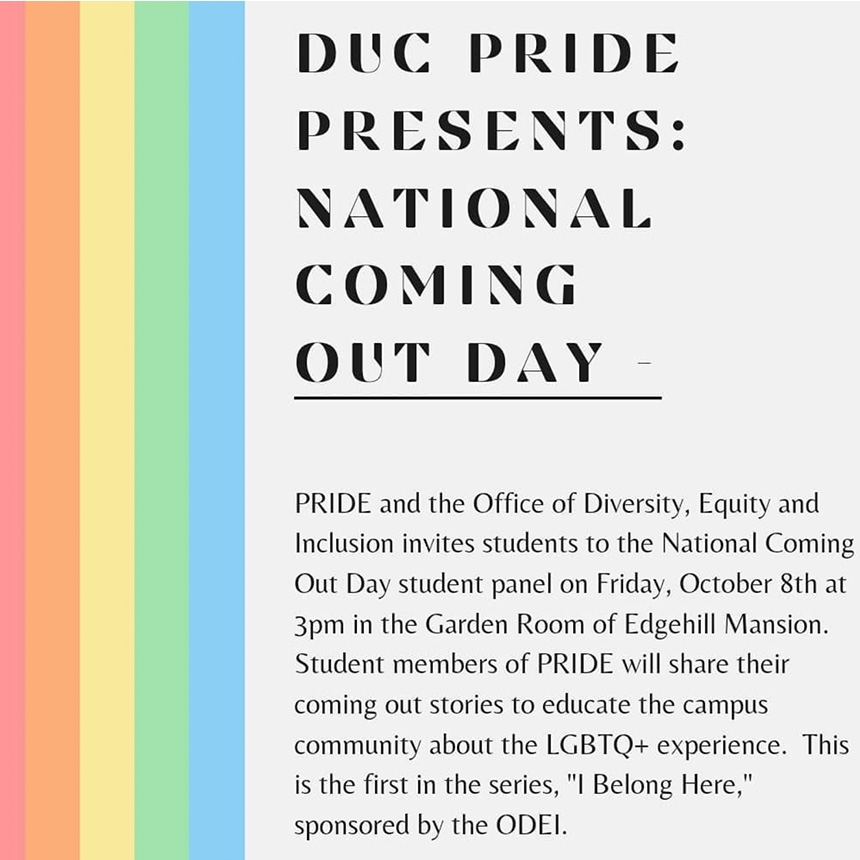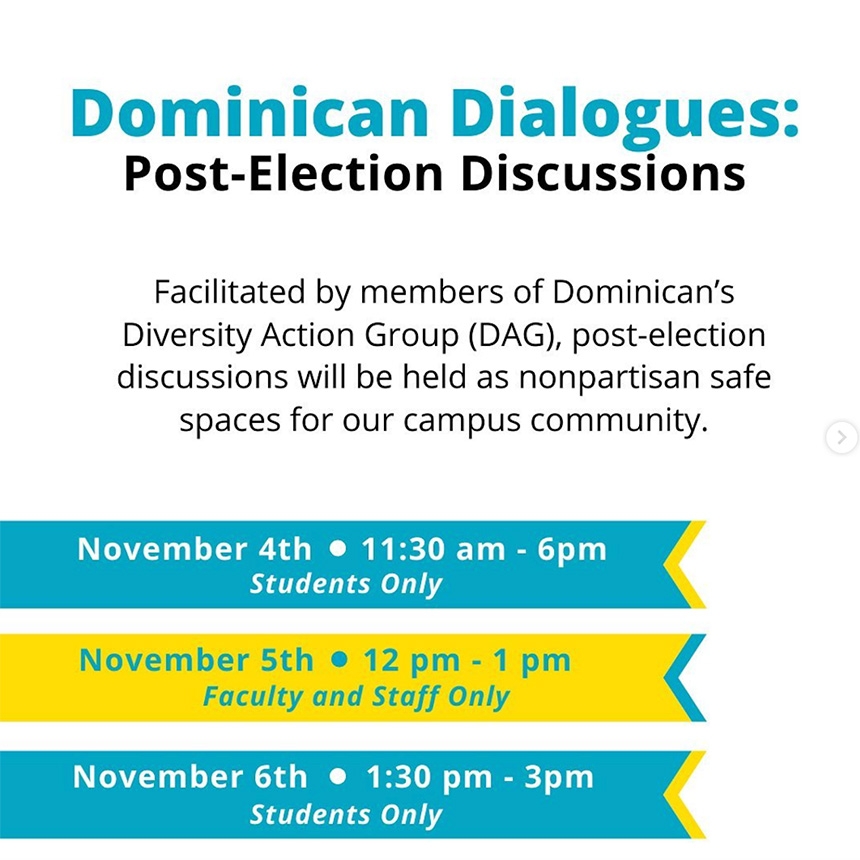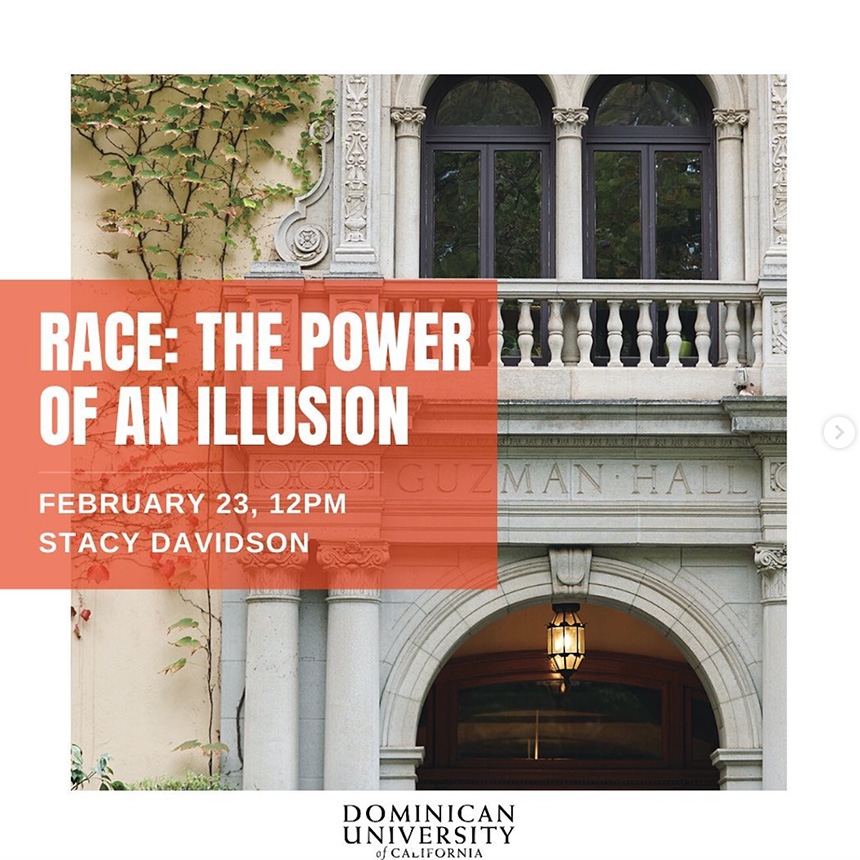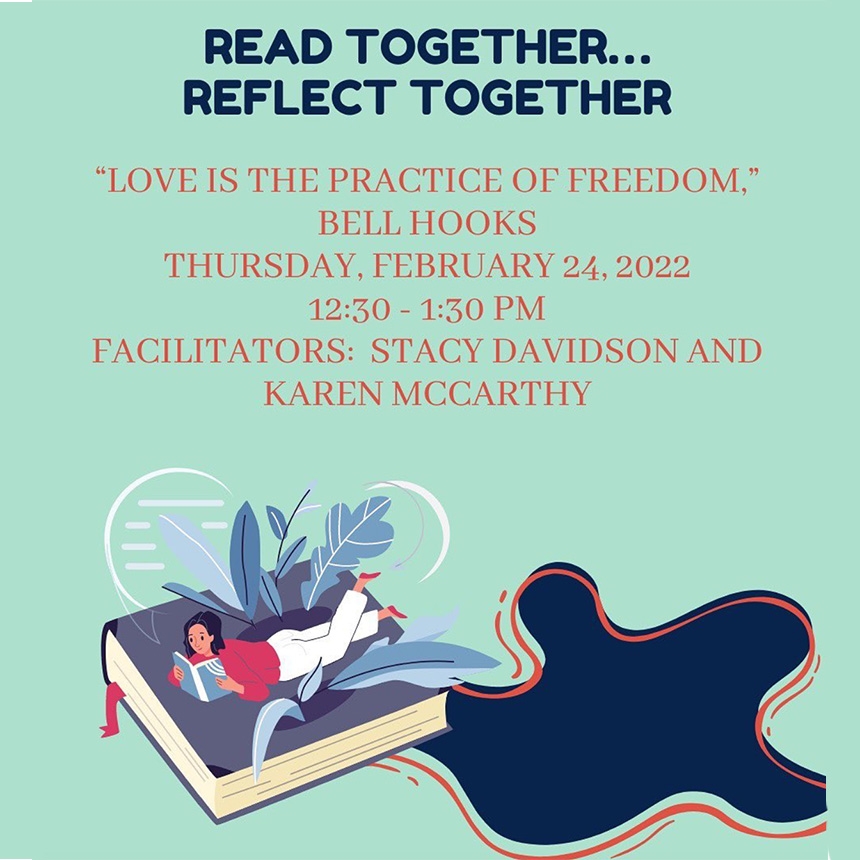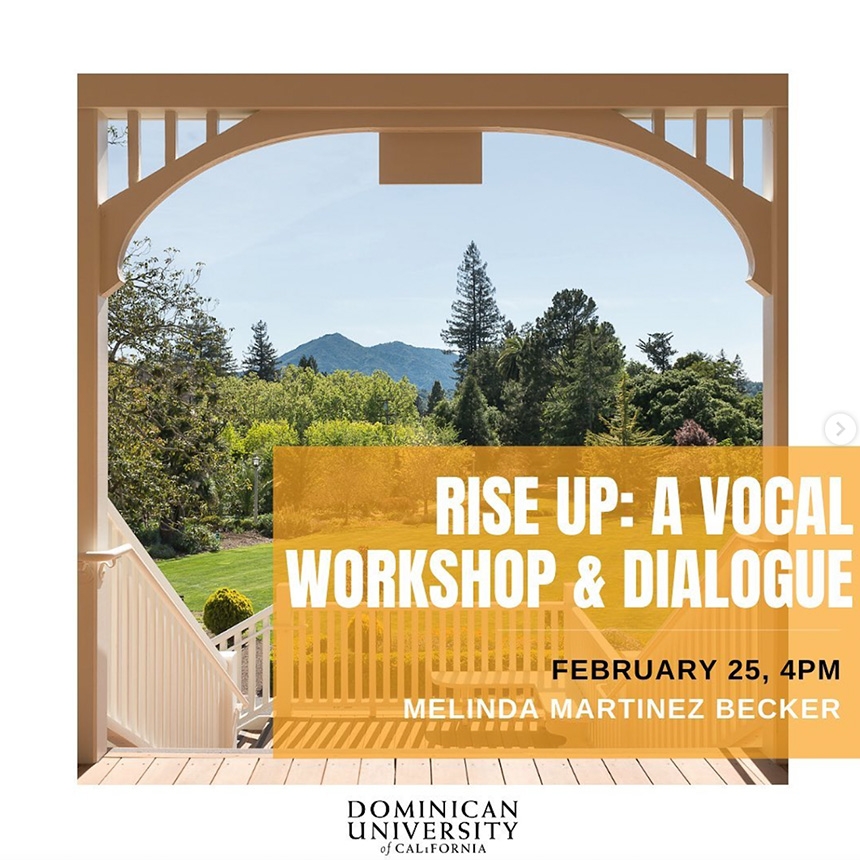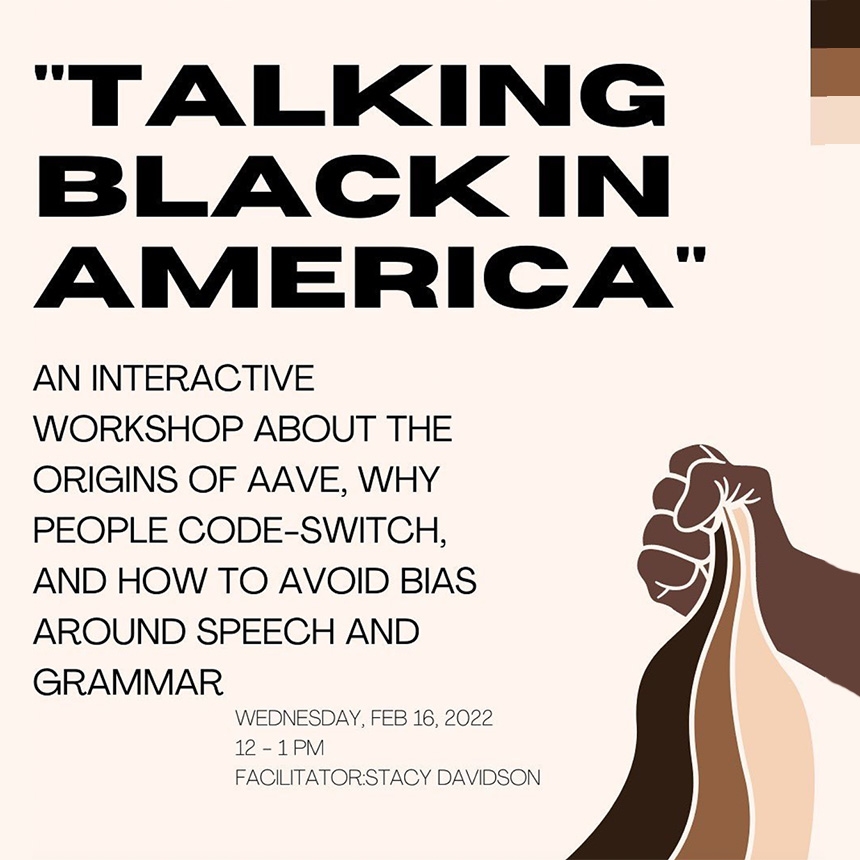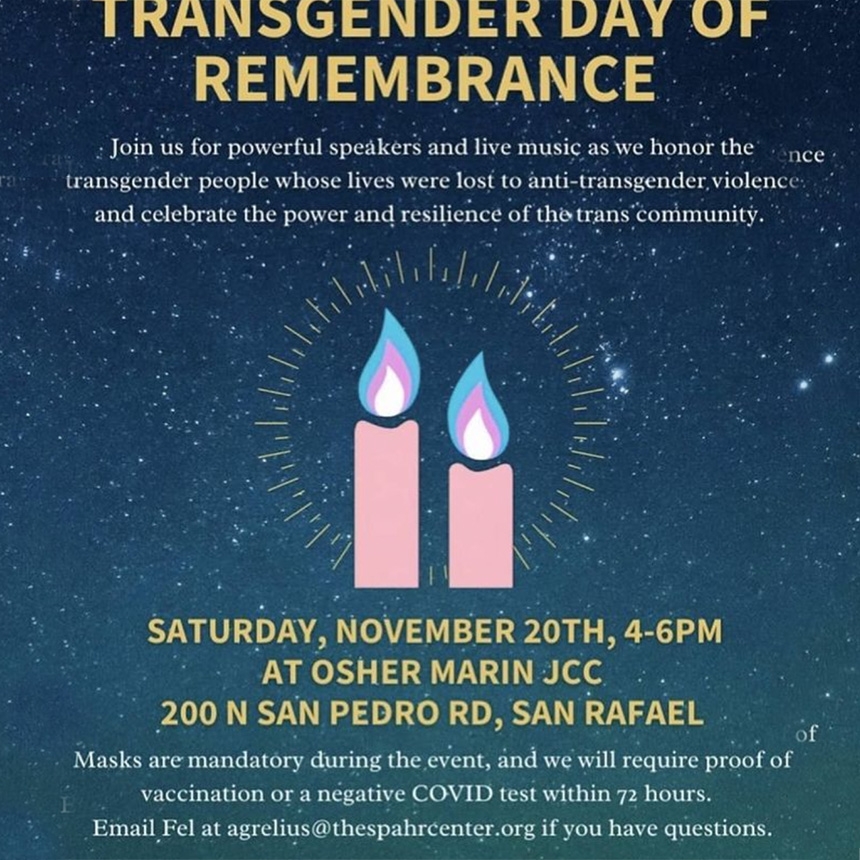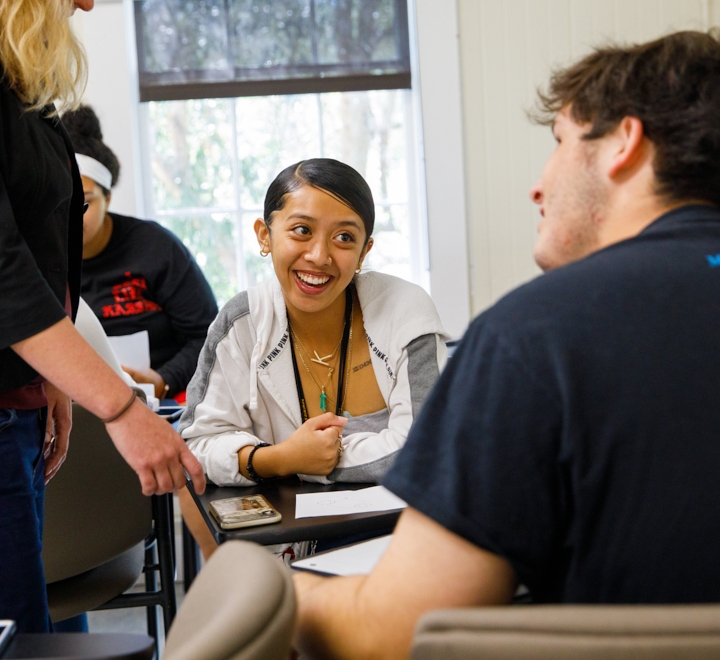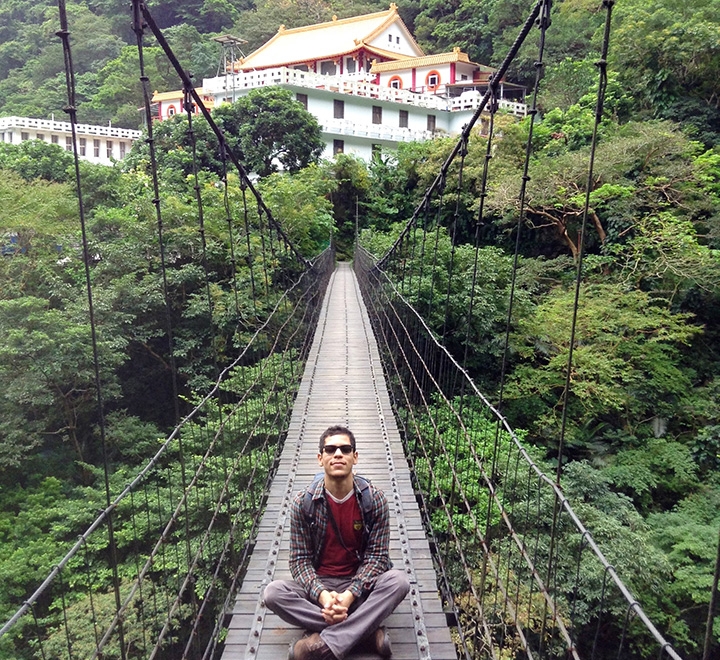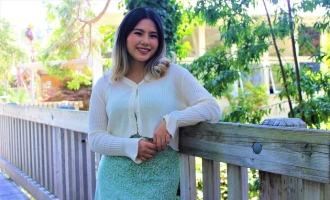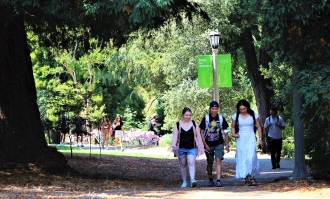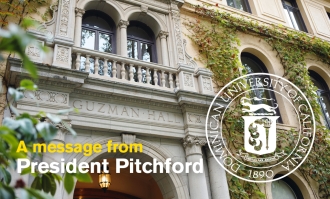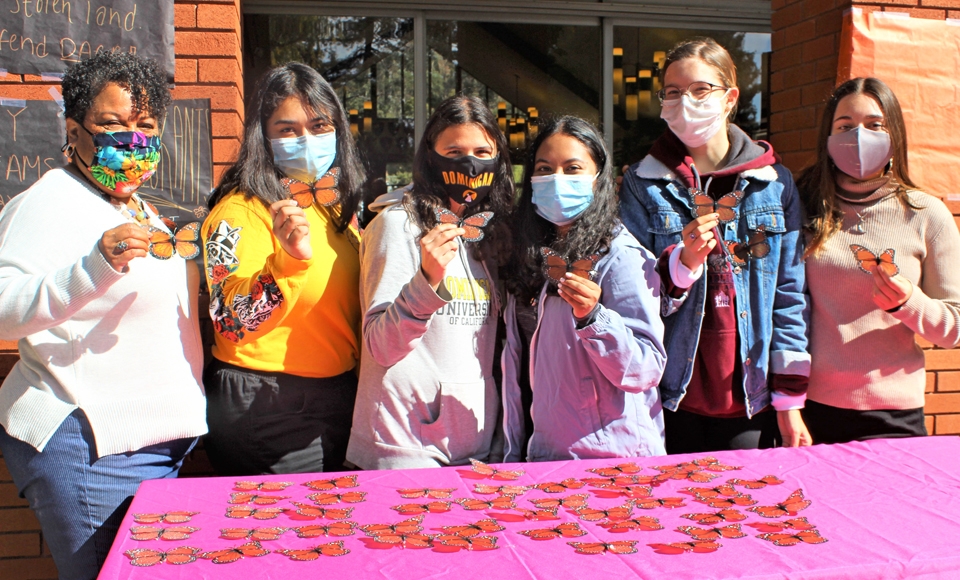
Community and Belonging in Action
The Diversity Action Group (DAG) is a standing committee of faculty, staff, administration, and students charged with the mission of advocating for, and creating a diversity sensitive institutional environment at Dominican for all stakeholders.
DAG members are involved in community building efforts on campus, such as facilitating professional development workshops and campus conversations.
Membership is open to all campus constituents and we strive to be a committee that equitably represents the diversity of the University community, including but not limited to the categories of race, ethnicity, sex, gender, class, age, ability, and religious belief. To join, please email dei@dominican.edu.
Land Acknowledgement Statement
Dominican University of California is located on land originally occupied by the large Miwok village of Awanewis.
Working in consultation with the Coast Miwok Tribal Council, who are lineal Marin Coast Miwok descendants, the University has developed the following "Land Acknowledgement Statement."
This statement is intended to increase our knowledge of and pay respect to the strong and enduring relationship between indigenous people and the land. The University is committed to an ongoing partnership with Coast Miwok people through listening and learning in order to understand fully what it means for Dominican to take responsibility for our stewardship of this precious, unceded native land.
The Indigenous Partnership Circle is pleased to provide the following "Land Acknowledgement Statement" that can be used in oral or written form at events as deemed appropriate. The campus encourages those who are interested to use the following language, without edits.
The campus community is encouraged to present the land acknowledgement statement at any Dominican University of California event held on the DU campus.
Dominican University of California in San Rafael occupies the unceded ancestral land of past, present, and future Coast Miwok people and the Coast Miwok Tribal Council of Marin. We wish to acknowledge and respect the Coast Miwok, this land’s original stewards, and honor this stolen land named Awanewis (red ochre baskets). We acknowledge that indigenous people had and continue to have a deep and sacred relationship with this land, and that the taking of land was violent and destructive.
We acknowledge that in the colonization of California, the Catholic church, especially through the mission system, and the early Spanish, Mexican, and American governments decimated indigenous people and attempted to eradicate their culture.
Dominican University of California commits to an ongoing partnership with Coast Miwok people through listening and learning, and seeks to honor and develop harmonious connections with all indigenous people and this land.
A land acknowledgement formally recognizes and pays respect to the indigenous people who once lived where Dominican University of California stands today. It is intended to raise awareness regarding the enduring relationship between indigenous people and the land.
The Diversity Action Group (DAG), at the direction of the Director of Diversity, Equity and Inclusion, created a Working Group to write a statement. After several months of listening to indigenous community members, researching area institutions’ statements and best practices, the Working Group invited members of the Coast Miwok Tribal Council to guide us in the creation of a statement. With their active participation and approval, a joint, collaborative statement was created in September, 2021. Because the DAG is committed to more than writing statements, and the Working Group has become a community, we changed our name to the Indigenous Partnership Circle to acknowledge equity and inclusion in the ongoing commitment to our indigenous partners.
This statement can be used at any DU sponsored events, including classes. The statement can also be used by faculty and staff who may be presenting at conferences, either verbally or in writing.
The host of an event may present the land acknowledgement statement during opening comments. The statement may also be included on printed agenda or materials if desired. Departments and individuals may choose to provide further context, information, or comment as appropriate to each individual event at the discretion of the speaker.
Community and Belonging Awards
The Melba Beals Awards for Excellence in Diversity have historically recognized current students, faculty, and staff who have actively engaged with others in advancing diversity and inclusion in our community.
2018
Emanuel Cifuentes Machado (student)
Noreen Hasan (student) and the SDAC (Student Diversity Action Committee)
2017
Kylie Timmerman (student)
Olivia Catolico, Nursing (faculty)
Casey Halcro, Human Resources (staff)
2016
Jennessica Holliday (student)
LeeAnn Bartolini (faculty)
Dr. Beals joined Dominican in 1999 after a successful career as a print and broadcast journalist.
Shortly after joining Dominican, Dr. Beals founded a communications program that has grown into the Department of Communications and Media Studies. During her 11 years of service, first as director and then as chair, Dr. Beals led the department as it grew in terms of enrollment and academic programming.
Thanks to her leadership, the Department responded swiftly to the rapidly changing media industry. As the news broadcasting and publishing industries merged with video and web formats, the department broadened to reflect this media convergence. Students gained the opportunity to write across media and learn new technologies such as podcasting, broadcasting, and production of enriched online viewer experiences.
The department also expanded to enable students to pursue their studies along more specialized paths. Today the Department of Communications and Media Studies offers courses in cinema studies, print media, broadcasting, corporate communications, and sports communications.
Dr. Beals introduced several programs that allowed students to gain real-world experiences while studying communications at Dominican. She oversaw development and growth of Radio.Dominican.edu, the university’s student-operated Internet radio station, as well as The Habit, the student-managed newspaper. Dr. Beals helped to establish the Bettie Grinnell Communications Lab in Archbishop Alemany Library, leading fundraising efforts to upgrade the lab and collaborating on the design and layout.
Since 2001, Dr. Beals has been a founding member of the Diversity Action Group, which is credited with collaboratively transforming Dominican into a diversity affirming institution at a time when the University’s student body was becoming increasingly diverse. In 2012, Dr. Beals created the TORCH (Together on the Road to New Chapters) leadership program designed to support students entering Dominican with a structured orientation program followed by ongoing mentoring.
Just as her work at Dominican is defined by her commitment to our students, Dr. Beals’ life is defined by her commitment to equality for all. She is a true champion of justice and equity.
Dr. Beals was one of nine African-American high school students in 1957 to integrate Central High School in Little Rock, Arkansas.
Under protection of the 101st Airborne dispatched by President Eisenhower, she, and eight other African American youths, integrated the previously all-white Central High School as one of the Little Rock Nine, defying mobs and death threats to tear down walls of segregation. A detailed account of this history making incident may be found in her award-winning memoir, Warriors Don’t Cry, which has been translated into five different languages.
Warriors won the 1994 American Library Association Award for Nonfiction Book of the Year, was named a Notable Book of the year by the American Booksellers Association, and received the coveted Robert F. Kennedy Award for Excellence in Writing. A play based on her autobiography was produced by The Bushnell Center for the Performing Arts. The play has been performed in New York City and throughout New England.
Dr. Beals holds more than 100 awards for heroism and courage. In 1999, the U.S. Congress voted Dr. Beals and her Little Rock Nine companions the Congressional Gold Medal — the nation’s highest honor — for their contribution to the Civil Rights movement. In 2002, Dr. Beals was named to the Marin Women’s Hall of Fame. In 2012, she was honored by the Marin Human Rights Commission.
In 2007, in recognition of the 50th anniversary of the integration of Central High School, the U.S. Postal Service issued a postage stamp to honor the Little Rock Nine. The Post Office's stamp was one of 10 commemorative postage stamps in a series called "To Form a More Perfect Union." That same year, Dr. Beals and the other eight members of the Little Rock Nine attended the unveiling of a life-size statue of all nine on the grounds of the Arkansas State Capitol. The sculpture depicts the Little Rock Nine walking together, books in hand, as they did in 1957 entering the historic high school. Also in 2007, the United States Mint issued the Little Rock Central High School Desegregation silver dollar.
Dr. Beals has had successful careers in journalism and public relations, holding posts as an on-camera television reporter for KQED’s noted Newsroom and as an NBC-TV news reporter, and as a radio news talk show host for KGO, ABC radio, San Francisco. Her articles have appeared in People, Family Circle, Ladies Home Journal and the San Francisco Chronicle Sunday magazine.
Dr. Beals earned her bachelor's degree in journalism from San Francisco State University and a graduate certificate in journalism and media granted by the Ford Foundation and Columbia University. In 2009, she received her doctoral degree in international multicultural studies from the University of San Francisco.
Dr. Melba Beals retired from Dominican as Chair Emeritus of the Department of Communications and Media Studies in January 2014.

